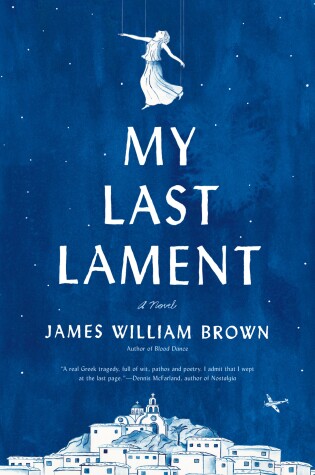
A poignant and evocative novel of one Greek woman’s story of her own—and her nation’s—epic struggle in the aftermath of World War II.
Aliki is one of the last of her kind, a lamenter who mourns and celebrates the passing of life. She is part of an evolving Greece, one moving steadily away from its rural traditions. To capture the fading folk art of lamenting, an American researcher asks Aliki to record her laments, but in response, Aliki sings her own story...
It begins in a village in northeast Greece, where Aliki witnesses the occupying Nazi soldiers execute her father for stealing squash. Taken in by her friend Takis’s mother, Aliki is joined by a Jewish refugee and her son, Stelios. When the village is torched and its people massacred, Aliki, Takis and Stelios are able to escape just as the war is ending.
Fleeing across the chaotic landscape of a postwar Greece, the three become a makeshift family. They’re bound by friendship and grief, but torn apart by betrayal, madness and heartbreak.
Through Aliki’s powerful voice, an unforgettable one that blends light and dark with wry humor, My Last Lament delivers a fitting eulogy to a way of life and provides a vivid portrait of a timeless Greek woman, whose story of love and loss is an eternal one.
I would like to devour every single WWII historical fiction book ever written. Why? I don’t know. I have some unhealthy fascination with WWII that was birthed in my one of my high school creative writing courses. As the years have gone on, I’ve relished reading novels that reveal new stories and histories not taught in the classroom. This is why I requested The Last Lament from Netgalley.
Covering Greece’s Nazi occupation and the years after the war, The Last Lament tells the story of one woman’s journey as records her story for a researcher relieving some of the most heartbreaking moments in her life. I was hoping to discover a new perspective, learn a bit more about World War II while connecting with a new culture that was affected by the war that I know little about.
The Last Lament attempts to cover too much ground in its 350 or so pages. It hits every World War II trope possible while doing little to explain the Greek Culture, the Nazi Occupation of Greece and the volatile years of changing political powers in the months and years the followed. As a result, this story could have been set in just about any country the Axis powers occupied during this timeframe in history.
What kept me reading? Something happened one night that tore a small Greek village apart. I needed to know what happened and who was responsible. Brown teases the mystery throughout, unfortunately, because of all breadth of the story and the lack of threading one character’s story through out the narrative; the reveal is lackluster, leaving me disappointed.
Unfortunately, for me, The Last Lament was a plodding read. Aliki’s story was not unique and the failure to connect all the characters sufficiently left me feeling a lack of connection to the story and time period.
This review was originally posted on Second Run Reviews
Reading updates
-
Started reading
-
4 February, 2017:
Finished reading
-
4 February, 2017:
Reviewed
